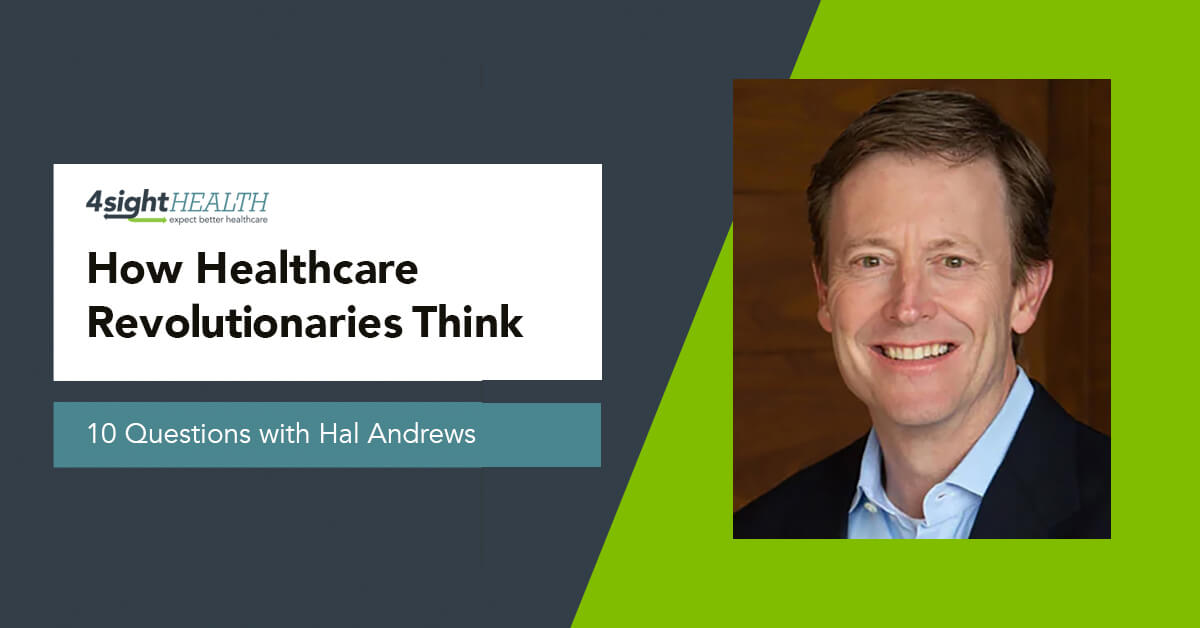November 26, 2024

How Healthcare Revolutionaries Think: 10 Questions with Hal Andrews
Welcome to the latest installment of 4sight Health’s series, How Healthcare Revolutionaries Think. Our interview series profiles healthcare instigators who believe that outcomes matter, customers count and value rules.
One such instigator is Hal Andrews, president and CEO of Trilliant Health. Trilliant, based in Brentwood, Tennessee, is a healthcare management consulting firm that uses analytics to help healthcare organizations grow their business, optimize their revenue and accelerate their market expansion.
Andrews is the brains behind the operation, whose motto is: “The most formidable competitor for every health economy stakeholder is the status quo.” That’s blasphemy to healthcare organizations that have feasted off the status quo for years to enrich themselves, their executives and their shareholders. You’ll notice that consumers are not beneficiaries of the status quo.
We’re pro-consumer here at 4sight Health, and we firmly believe that blowing up the healthcare status quo is the best way to put consumers at the center of the healthcare system. That’s why we wanted to talk to Andrews. We asked him about the traits he thinks are necessary to be a healthcare revolutionary, his aha moment when he realized the power of data to change the status quo, why competition is the secret to solve healthcare’s ills and what he thinks of the branches on Nashville’s healthcare family tree.
You also can listen to Andrews’ takeaways from Trilliant’s new 164-page report, 2024 Trends Shaping the Health Economy, on this accompanying podcast.
Separately, we unpacked the report in the Oct. 3, 2024, episode of our 4sight Health Roundup podcast, “Eight Trends Shaping the Current Healthcare System.”
1. Why don’t we start with the question that we ask everyone, and that’s for your definition of a healthcare revolutionary. What would you say?
Andrews: A healthcare revolutionary is someone who successfully challenges the status quo.
2. Short and to the point. But there’s a key word in there: successfully. What does success look like for a healthcare revolutionary?
Andrews: I think it has to be something more than just trying. I think it has to be more than being an entrepreneur with an idea. I think it’s something that has to change something that’s been long-established fundamentally. And I think the extent of the success is debatable, but it has to be something that everybody can look at a point in time and say, “I remember when that happened.” Maybe that didn’t turn out to be as meaningful as somebody thought, but everybody knows, “Yes, I remember when that happened.”
3. Do you have a favorite healthcare revolutionary either past or present? Someone you can say, “I remember when he or she did that,” about?
Andrews: Tony Miller. Tony was the co-founder and CEO of Definity Health, which was the first HRA (health reimbursement arrangement)/HSA (health savings account) way back in 1998. UnitedHealth Group bought Definity in 2004. Then he found Bind Benefits in 2016, which offers on-demand health insurance. He sold that to United in 2022, which rebranded it Surest. In both of those, he completely disrupted the way that healthcare was financed. I don’t know of any other single individual who has twice fundamentally changed how healthcare is financed. So, Tony would be my favorite revolutionary in terms of success but also of his mentality.
4. Tell me more about the mentality part, the personality part. What are some of his traits that you admire?
Andrews: The first one is that he’s fearless. The second is that he is someone who thinks critically and is willing to stand alone. I tell people that healthcare is a lot like “The Wizard of Oz.” There are people who don’t have brains and people who don’t have hearts and people who don’t have courage. Tony has all of those in abundance.
5. You’re the first one to use a “Wizard of Oz” analogy in our series. I’ll make sure that stays in. You describe yourself as an entrepreneur, executive and investor. Do you think you’re equal parts of all three? Or is there one dominant part among the three?
Andrews: Feel free to quote me on “The Wizard of Oz.” To your question, Dave, if I’m being honest, I’m not really an entrepreneur. I’m really a mercenary. I’m somebody who can go into a troubled situation and find the opportunity, find the needle in the haystack, and expose that to the rest of the world. So, I think of myself as a mercenary with a vision. I can airdrop in, look around, figure out what could work, what might work, and then try to make that work. If we’re successful, then people come along, and they acquire the company that we’re running, and I get fired. Then we will go do it again. I’m living the end of Butch Cassidy and the Sundance Kid over and over. I’ve been shot a lot, but I’ve managed to survive.
6. Entrepreneur is out. Executive and investor are in. Would you add healthcare revolutionary?
Andrews: I’d like to think that I am. I don’t think I lack courage. But I don’t think I can look at anything that I’ve done and say that it’s a real success. I haven’t done anything that has made a long-lasting mark that people say, “I remember when that happened.” We think we might have done that this time with the new trends report. Maybe that will be a moment in time people remember. But I’ll probably be dead before anybody decides whether I made an impact. I guess being a little pessimistic is part of being a healthcare revolutionary.
7. Probably comes from being fired over and over again. Thanks for bringing up the new trends report. It’s a great segue into my next question. That’s the role of data in the conversation about healthcare’s future. One thing I noted as I read the report, it kept saying — and I should have counted the times — that what I was reading was evidence-based, fact-based. Over and over again. At what point did you realize that you have to have data to do what you want to do in healthcare, whatever that is. Tell me about that aha moment.
Andrews: The first time I really thought about it was back in my days as a healthcare M&A lawyer. Back in the 90s, early 2000s, every healthcare deal that I was involved in seemed to have some representative from Cain Brothers on one side or the other. One of the people from Cain liked to say the only thing you should believe in the newspaper was the box score. It was his version of lies, damned lies and statistics. That’s the moment I remember first thinking about data and healthcare.
What amplified it for me was convincing the board of directors to buy a hospital in Massachusetts one time. The only piece of data that I had that was relevant to the market was a Mercedes-Benz dealership book. The hospital was being run into the ground, and no one really knew what was going on. I saw that there was a Mercedes dealership in this little town. I ordered the Mercedes dealership book and looked at how many towns had a sole community hospital and a Mercedes-Benz dealership. There were three. I thought, “The Germans must know something here.” At the same time, I got a lot of pressure from the board saying, “Are you kidding me? This is what you’re bringing us? There’s a Mercedes-Benz dealership, and you think the hospital can survive?” At that point, it became real to me that I needed to get better data. If I look back at a particular moment in my career, it was that one.
8. That’s a great story. Now let’s fast forward to the new trends report. Every page is filled with data to draw conclusions about the current healthcare system. Some people may read it and say, “Woe is me. Here’s where we are. There’s nothing we can do about it.” Others may read it and say, “OK, this is what I’ve been telling you anecdotally. Here are the facts. Let’s do something about it.” What does the report add to the conversation? How do you want the report to change the conversation?
Andrews: The reactions you’ve suggested are the reactions. What I say when I present the trends report is that most people know most of the things in the trends report. But as an industry, we do a poor job of synthesizing them and following the logic of them. If all of these things are true, then what? What we’ve seen over the past few years is an increase in the number of people who want us to come in and narrate the report, connect the dots, and then challenge their organization. If these things are true, then what do we have to do differently?
Underlying all of that is something that I know you’ve seen over your career. That I’ve seen. Historically we’ve been afraid to talk about competing in healthcare. We whisper to each other that, yes, healthcare is really a business. But for a long time, we thought that competing was impolite. The reality is that we all know that the commercially insured patient is the one who makes the world go round. It underwrites everything else. There is a declining share of those patients. If that is true, then you can’t continue to do what you’ve been doing.
There are a handful of exceptions, but those handful of exceptions are in markets that are prosperous, that are growing, that have great demographic characteristics. But for almost everybody else, they’re fighting over a smaller pie. They’re in a negative-sum game. You have to do something differently. The data would suggest that what we as an industry are doing isn’t working very well.
9. Foundationally, do you believe that competition is the way to improve quality, expand access and make prices more competitive?
Andrews: Yes. Data is emerging that shows that’s true. If you look at HCA (Healthcare), which is the scourge for many people in healthcare, and the performance of health systems that have had to compete with HCA compared with other not-for-profit systems that haven’t had to compete with HCA, their performance is better. I can look at the data and show you that the systems that have had to compete with people who are really good at competing perform above market benchmarks than people who don’t. Iron sharpens iron.
10. Speaking of HCA, years ago I spoke at an event in Nashville sponsored by the Nashville Health Care Council. I didn’t accept any payment or any other form of remuneration. But they did give me a poster of the Nashville Healthcare Family Tree as a parting gift. What’s your take on the Nashville Healthcare Family Tree? Is Nashville the center of the healthcare universe? I know it likes to think it is.
Andrews: The first thing is, that family tree is in about one-point font. You’ll need a magnifying glass to see the names on it. As a native Nashvillian, I’d say we’re really good at healthcare services. We’re good at supporting healthcare services. All of that goes back to HCA. It goes back to Dr. Frist Sr., and Dr. Frist Jr., and Jack Massey. If you unpack what’s on that family tree, you can trace probably 80% of the names on that tree to someone who was on HCA’s payroll in 1982. In the early 80s, HCA had the most amazing group of talent probably in the history of the industry.
At the same time, Nashville has never really produced a great analytics company. I’d like us to be that. Maybe we will someday. We don’t have any tech. We’ve tried. We don’t really have any medical devices. We’ve tried. None of the big EHR vendors are here. I know there’s a great hope that with Oracle coming to town it’s a sign that things are changing. There are a bunch of us out there rowing our boats as hard as we can to become a tech company. But I feel like for us — Nashville — to claim to be the center of the healthcare universe, we have to do more than one thing. Time will tell.
Burda’s Final Bit
I enjoyed talking with Hal Andrews for a number of reasons. First, we know a lot of the same people and a lot of the same organizations. It was fun swapping stories and comparing experiences. Second, we also share an unwavering belief in the power of data for change. It’s like “money talks, and bullshit walks,” or “actions speak louder than words.” As a healthcare journalist for more than four decades, I’ve heard my fair share of B.S. in words. It’s the numbers that tell the real story. The facts. Not alternative facts or fake news. That’s why I appreciate the hard work Andrews and his staff put into the new 2024 Trends Shaping the Health Economy. I consider it essential reading if you’re running a healthcare business. You may not like what it has to say. But the truth hurts sometimes.
—
Hal Andrews is a healthcare business leader with over 25 years’ experience as an entrepreneur, executive and investor. Hal has served as the President and CEO of Trilliant Health since its founding in June 2017. Hal currently serves on the Board of Directors of Trilliant Health and Mployer Advisor and on the Board of Advisors for the Nashville Capital Network.
Trilliant Health is a data analytics and insights company specializing in healthcare, focused on empowering providers, payers, and stakeholders with comprehensive market intelligence. Using advanced data science and AI-driven tools, Trilliant Health helps organizations understand healthcare market dynamics, identify growth opportunities, and make informed strategic decisions to improve patient outcomes and operational efficiencies.
Read more interviews with healthcare revolutionaries
Healthcare Revolutionary Julie Murchinson
Healthcare Revolutionary David Terry
Healthcare Revolutionary Matt Marek
Healthcare Revolutionary Mark Engelen
Healthcare Revolutionary Chris Johnson
Healthcare Revolutionary Ramona Wallace, D.O.
Healthcare Revolutionary Alejandro Quiroga, M.D.
Healthcare Revolutionary Samir Goel
Healthcare Revolutionary Marcus Whitney
Healthcare Revolutionary Demi Radeva
Healthcare Revolutionary Michael Pitt, M.D.
Healthcare Revolutionary Rebeckah Orton
Healthcare Revolutionary Dan Trigub
Healthcare Revolutionary Bruce Brandes
Healthcare Revolutionary Lena Chaihorsky
Healthcare Revolutionary David Nash, M.D.
Healthcare Revolutionary Esther Dyson
Healthcare Revolutionary Meghan Conroy
See if your favorites are included in the series and let 4sight Health’s David Burda know who you consider to be a Healthcare Revolutionary.





